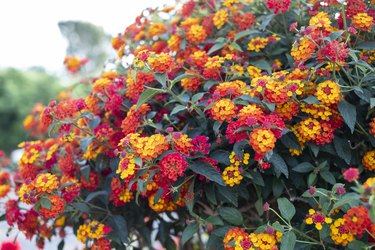For many of us, long summer evenings are the very best part of the year. Sitting out on the deck and enjoying a gentle breeze after the heat of the day while sipping a glass of something cold ... it would be perfect if it weren't for those pesky mosquitoes. There are ways to keep them at bay, of course, from screening to insect repellents. Those are effective, but most require work (screen maintenance) or chemicals (DEET), which aren't always welcome. Surrounding yourself with plants that naturally repel mosquitoes is an easier and more natural option. Here are 10 that can help keep the little pests away from you.
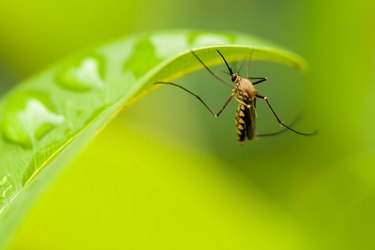
Video of the Day
Tip
The old adage that says "an ounce of prevention is worth a pound of cure" definitely applies to mosquitoes. Diligently removing any sources of standing water (a mosquito-breeding habitat) from your property is always the first step you should take to discourage them.
1. Lavender
Mosquito-repellent plants almost all work by interfering with the mosquitoes' ability to locate you by scent. As it happens, humans appreciate strongly scented plants, so we have a lot of them. Lavender (USDA plant hardiness zones 5-8) is one of the most popular. It's grown for culinary use and as an ingredient in scented products. You might not have known it would help keep mosquitoes away, but it certainly can. Crushing a sprig or two and leaving them around or rubbing them directly on your skin can help minimize the risk of being bitten. Lavender is a hardy perennial, so it's a low-maintenance option.
Video of the Day
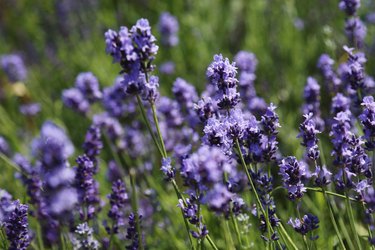
2. Mint
The mints are a large family of aromatic plants (there are other representatives on this list), but for the moment we'll consider just those we speak of as "mint." All of them, including peppermint and spearmint, are strongly scented and pleasant for humans, and they repel mosquitoes. Mint (USDA plant hardiness zones 5-8) in general is a rather invasive plant to have in your garden, which makes it a good choice for container gardening. That in turn means you can easily keep a few pots on your deck, patio or balcony. Not only will they help keep mosquitoes away but they'll be close at hand for when you're making cocktails or herb teas.
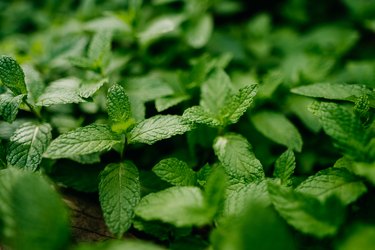
3. Catnip
Another member of the extended mint family is catnip (USDA plant hardiness zones 3 to 7), sometimes known by the more informative name "catmint." You may know it best as the sad little packet of dried herb that comes with cat toys, but it's a very appealing addition to your herb garden or patio planter. Like other mints, it grows vigorously, smells beautifully aromatic, and produces spikes of small, delicate purple flowers. Not only will your cats love it but it makes a pleasant cup of relaxing herb tea for the humans too. Like other mints, you can crush a leaf or two or rub them directly on your skin to activate the plant's essential oils. Those include a terpene called nepetalactone, a natural mosquito repellent that's more potent than DEET (and is thought to repel fleas as well).
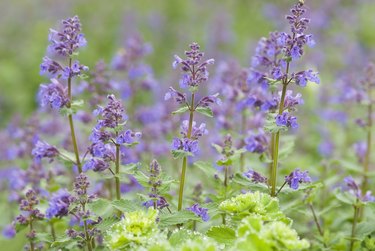
4. Lemon Balm
Lemon balm (USDA plant hardiness zones 3-7) is yet another member of the mint family despite its sharply different aroma. Although its leaves are visibly mintlike, its scent, as you'd expect from the name, is very lemony. It's typically grown for culinary use or herbal teas, where it lends a pleasant, citrusy tone. Like other mints, lemon balm grows pretty vigorously and can become invasive, so it's an ideal candidate for your balcony garden or a patio planter. A few leaves scattered underfoot around your seating area should help keep those pesky "skeeters" away.
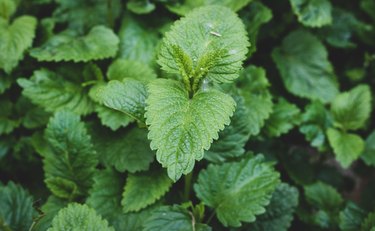
5. Lemongrass and Citronella Grass
Lemongrass (USDA plant hardiness zones 10-11) and citronella grass (zones 10-12) are two subtropical species that grow widely across Southeast Asia. Lemongrass is best known as an ingredient in Thai cuisine, while citronella grass contains the active ingredient that goes into citronella candles and citronella-oil torches. They can be grown outdoors as annuals or in pots so you can enjoy their citrusy fragrance year-round. Having your own supply of lemongrass on hand can be convenient for culinary purposes as well. Note that the so-called "citronella plant" or "mosquito plant" often sold at garden centers is an unrelated species – a scented geranium, or pelargonium – and mosquitoes don't really seem affected by it.
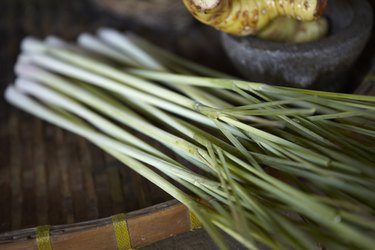
6. Marigolds
Many of the most popular flowers combine bright, beautiful blossoms with a pleasant fragrance. Marigolds (an annual, USDA plant hardiness zones 2-11), despite their wide popularity, aren't among that number, as their scent could politely be described as a pungent funk. That's what makes them a good mosquito repellent. Marigolds are also widely favored by gardeners as a companion plant for the vegetable garden, where they are credited for keeping a number of insect pests from affecting your harvest. They're at home anywhere around the property in beds or planters, so plant them lavishly.
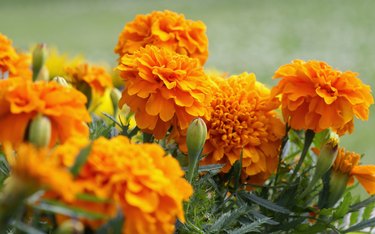
7. Tansy
Tansy (USDA plant hardiness zones 3-8) is an old-fashioned herb that was brought from Europe by early settlers. Historically, it had culinary and medicinal uses, but we now know it's too toxic to take internally. That being said, its buttonlike yellow blossoms are loved by bees and other pollinators, and its foliage has a pleasant scent of mint and camphor when crushed.
Tansy oil was used traditionally against fleas and commercially in insect repellents before DEET was invented, and research shows it can repel ticks as well. That makes it a no-brainer as a bug repellent, but unfortunately, tansy has a dark side. Not only is it toxic when ingested but it's a highly invasive weed. While you may not want to plant it in your garden, it's readily available to forage. Look for it on broken ground or at the edges of trails and dirt roads, where it's easy to find in high summer.
Tip
Before applying any crushed herb to your skin as an insect repellent, test it on a small area first in case you develop a reaction. That precaution is especially important with tansy because the plant’s oils are so potent.
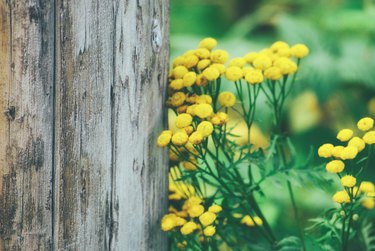
8. Rosemary
Like lavender, rosemary (USDA plant hardiness zones 8-10) is a Mediterranean herb with a strong scent and a long history of culinary use. You'll be familiar with its sharp, pinelike aroma from the kitchen, especially in Italian foods, but its scent can repel mosquitoes just as readily as it attracts hungry humans. Rosemary's affinity for foods, and grilled foods specifically, makes it a great choice for the patio garden. Whenever you fire up your grill, throw a sprig or two of rosemary onto the coals. The aromatic smoke will infuse your foods with flavor while simultaneously helping to conceal you from patrolling mosquitoes.
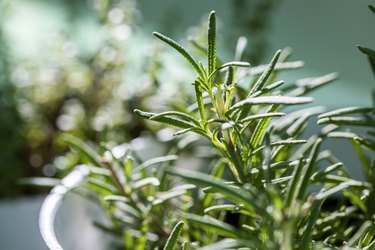
9. Basil
As with rosemary, basil (an annual, USDA plant hardiness zones 2-11) is best known as a culinary herb. Its strong fragrance makes it a signature ingredient in cuisines from Italy to Thailand, making it one of the best plants to keep in your arsenal. Want to make pesto? You're covered. Want to keep the mosquitoes away? Basil can help with that too.
You won't even usually have to decide between using the leaves in the kitchen or crushing them to befuddle mosquitoes. Basil will try to send up flower spikes all summer long, and you need to pinch them off in order to keep the plant producing vigorously. If you do that in the evenings while you're sitting outside, you'll naturally flood your seating area with a mosquito-deterring scent.

10. Lantana
The bright, beautiful blossoms of lantana plants make them a firm favorite with many gardeners, and it turns out that their sweet scent can also help keep mosquitoes away. That's a pretty compelling argument for growing them. Lantana won't flourish outside of USDA zones 9 to 11, but that just gives you an excuse to grow them on your deck or patio in planters. That way, you can bring them in during the cold months and enjoy them year-round. Choose wisely, though. Some varieties can grow to 6 or more feet, which may be more than you'd bargained for.
